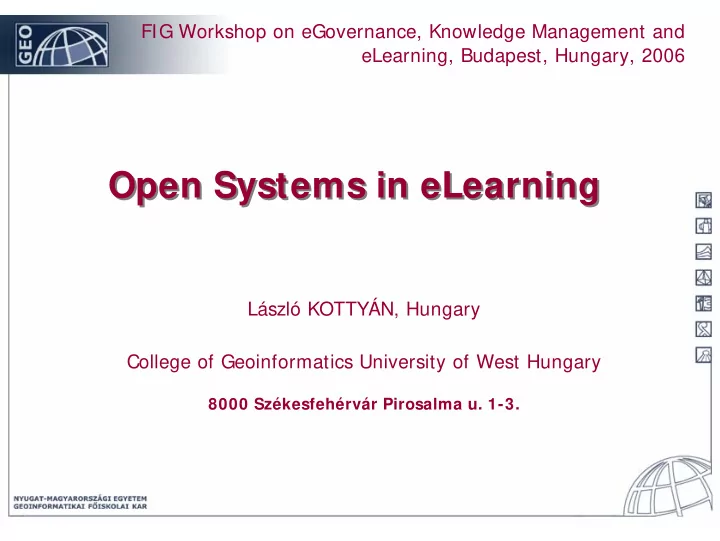

FIG Workshop on eGovernance, Knowledge Management and eLearning, Budapest, Hungary, 2006 Open Systems in eLearning Open Systems in eLearning László KOTTYÁN, Hungary College of Geoinformatics University of West Hungary 8000 Székesfehérvár Pirosalma u. 1-3.
Educational portals • June 2005 : Virtual GEO for postgraduate students, distance learning form, ~ 140 users, http:/ / www.vgeo.hu • September 2005 : EGEO for BSc/ BA students, full time and part time learning form, ~ 500 users, http:/ / www.egeo.hu • The decision to run two portals was made based on different requirements of education forms as for example: different educational and organisational structures and different e-learning solutions. • Portals based on MOODLE framework 2
MOODLE • MOODLE: open source, free, e-learning framework, and course management system with good customizing capability • User roles: • Administrator is able to maintain the whole portal including portal development, user management and course management tasks. • Course creator has right to create new courses, upload content to the course and add users to the course. • Teacher is able to upload or modify the content of the course, communicate with students, and evaluate them. • Students have the right to display and download course content and perform activities. 3
Virtual GEO • The Virtual GEO portal, which is used for postgraduate forms of education, has only one course creator, who is responsible for all courses and teachers have no right to upload course content by themselves. • The teachers’ main task is to evaluate and assess students. • This system is so called centralized and is suitable for maintenance of distance learning programmes. • Registry and quality management functions are implemented also. 4
5
EGEO • The EGEO portal for graduate students uses a decentralized system for the administration and management tasks. I t means that each department of the College has own course-creator, who is responsible for maintenance of all courses of the department. • This structure enables different level of teachers’ involvement in course activities. The teachers, who prefer traditional education methods, provide the digital materials to the course creator, who uploads them to the portal. All course materials are available for students through course. • Teachers with ambitions of active participation on course during the semester have possibility to maintain materials by themselves with full support of official course creator. This approach enables to keep the course content in active form and updated. 6
7
Course • A course itself is a collection of digital education materials and activities related to a subject or module. • There are several possibilities to present a digital materials in MOODLE environment like web pages editing, linked files (e.g.: pdf, text, ppt, and etc.), displaying flashes or other multimedia contents. • The interactivity of portals is enabled by wide scales of activities. 8
9 • E-mail sending for Activities course participants • Messaging system • Communication:
Publishing on I nternet Publishing on I nternet • On EGEO portal there is possibility to create some thematic contents. • EGEO LI BRARY: • Science: it can contain the results of activities of GEO researchers or high quality diploma works of students. • Education: in this category can be placed materials in greater detailed field, information about exchange programs, glossaries, wikis, etc... • Free time: it is for pages in different sphere of interests, hobbies with chat rooms, forums. • According to conception, pages are maintained by authors or supporting departmental course creator. Access can be public or limited. 10
11 http:/ / www.vgeo.hu Thank you for your attention! kl@geo.info.hu http:/ / www.egeo.hu
Recommend
More recommend